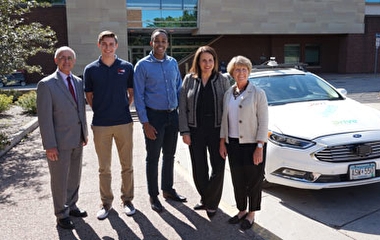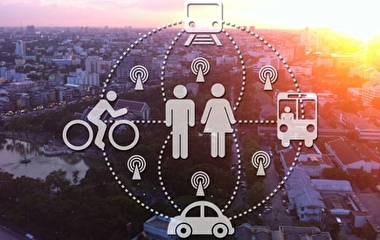CTS has awarded seed funding to three new projects that will explore topics across the transportation spectrum, from last-mile delivery to transit electrification to post-pandemic travel behavior.
The seed funding, awarded biennially, aims to help CTS Scholars develop expertise in emerging areas and foster strategic relationships that position them for future funding opportunities.
A project led by Saif Benjaafar, Distinguished McKnight University Professor in the Department of Industrial and Systems Engineering, will focus on developing a data-driven framework for a crowdsourced last-mile delivery system. Many retailers are increasingly relying on this method of delivery to meet the growing challenges of shorter delivery times and higher volumes, but there is limited research on how to effectively design, plan, and operate such a system.
Benjaafar’s project will lay out a foundation for the system’s design and management, develop data-driven algorithms to support its implementation, and test and validate these algorithms using real-world data from two major online retailers: Target and its affiliate Shipt in the US and JD.com in China. The project’s algorithms and models will account for the interaction between customer demand, retailer decisions, and the decisions of independent drivers. Ultimately, they could also be adapted to account for other criteria, such as environmental impacts or labor welfare.
Alireza Khani, assistant professor of civil, environmental, and geo- engineering, will lead a project focused on the transition to electric transit systems. Work will include developing a practical, realistic plan to facilitate an incremental transition to electric vehicles using existing charging infrastructure and the current transit network layout.
As part of the effort, Khani and his team will create long-term infrastructure and fleet replacement plans as well as strategies for short-term decisions, such as bus scheduling or dispatching, that are compatible with the long-term plans. Successful implementation of the project will help transit agencies navigate the transition to an electric system with lower costs and risk, achieve social-environmental benefits such as reducing greenhouse gas emissions, promote transit and clean transportation, and improve public health and social equity.
In another project, Humphrey School professor Yingling Fan will lead a team of researchers exploring the implications of COVID-19 on public transportation and the travel behavior of downtown Minneapolis commuters. The COVID-19 pandemic and widespread social distancing measures have dramatically reduced public transit ridership, and it is unclear how long it will take for transit to recover. This research will aim to collect firsthand data about how downtown Minneapolis commuters make decisions related to travel behavior after the pandemic is largely contained.
Study participants will use a smartphone app that semi-automatically collects daily travel behavior activity and prompts users to answer context-specific questions about how they make various trip decisions—including how their COVID-19 experiences play a role in shaping them. Results will help transportation planners and engineers identify innovative and sensible ways to effectively promote the use of public transportation in the post-pandemic era.



